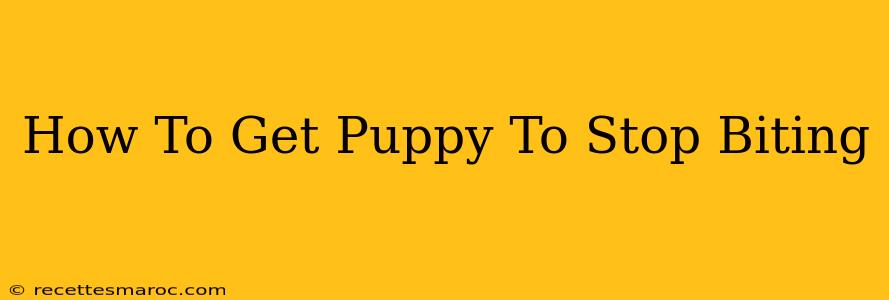Bringing home a new puppy is incredibly exciting, but those adorable little teeth can quickly become a source of frustration. Puppy biting is a normal part of development, but it's crucial to address it early and effectively. This guide provides a comprehensive approach to teaching your puppy to inhibit their bite, ensuring a happy and harmonious relationship for both of you.
Understanding Puppy Biting
Before diving into solutions, it's important to understand why puppies bite. They don't do it out of malice; it's usually due to one or more of the following:
- Teething: Puppies' gums are sore and itchy as their adult teeth come in. Biting provides relief.
- Exploration: Puppies explore the world through their mouths. Biting is a way of learning about textures and objects.
- Play: Rough-and-tumble play often involves biting, especially with littermates.
- Excitement: Over-excited puppies may bite out of sheer exuberance.
- Fear or Anxiety: A scared or anxious puppy may bite as a defensive mechanism.
Effective Strategies to Stop Puppy Biting
Addressing puppy biting requires a multi-pronged approach focusing on prevention, redirection, and consistent training.
1. Prevention: Managing the Environment
- Supervise closely: Never leave your puppy unsupervised, especially during playtime. Constant supervision allows you to intervene immediately if biting occurs.
- Provide appropriate chew toys: Offer a variety of safe, engaging chew toys to satisfy your puppy's need to gnaw. Rotate toys regularly to keep them interested. Consider frozen kongs filled with peanut butter or other puppy-safe treats.
- Create a safe space: Designate a quiet, comfortable den where your puppy can retreat when feeling overwhelmed or tired. This reduces the likelihood of biting out of anxiety.
- Manage your puppy's energy levels: A tired puppy is less likely to bite. Ensure sufficient opportunities for exercise and playtime.
2. Redirection: Teaching Acceptable Behaviors
- Redirect biting to toys: When your puppy bites you, immediately replace your hand or body part with an appropriate chew toy. Praise and reward when they chew the toy.
- "Ouch!" method: When your puppy bites, give a sharp but gentle "ouch!" Then, completely ignore your puppy for a few seconds before resuming interaction. This teaches them that biting results in the loss of attention.
- Time-outs: For more persistent biting, gently place your puppy in their safe space for a short time-out (a minute or two). This helps them calm down and learn that biting leads to separation.
3. Consistent Training: Building Good Habits
- Positive reinforcement: Reward good behavior with treats, praise, and petting. This reinforces the desired behavior and makes it more likely to repeat.
- Bite inhibition training: Gently play with your puppy, allowing them to nip. If the bite is too hard, immediately stop playing and ignore them for a short period. This teaches them to regulate the force of their bite.
- Socialization: Expose your puppy to various people, animals, and environments in a controlled and safe manner. This helps them learn appropriate social behavior and reduces the likelihood of biting out of fear or anxiety.
When to Seek Professional Help
If you're struggling to manage your puppy's biting despite consistent effort, don't hesitate to seek professional help. A certified dog trainer or veterinarian behaviorist can provide personalized guidance and address underlying issues.
Remember: Patience and consistency are key. It takes time and effort to train a puppy to stop biting. Celebrate small victories and stay committed to your training plan. With consistent effort, you can enjoy a loving and bite-free relationship with your furry friend.

